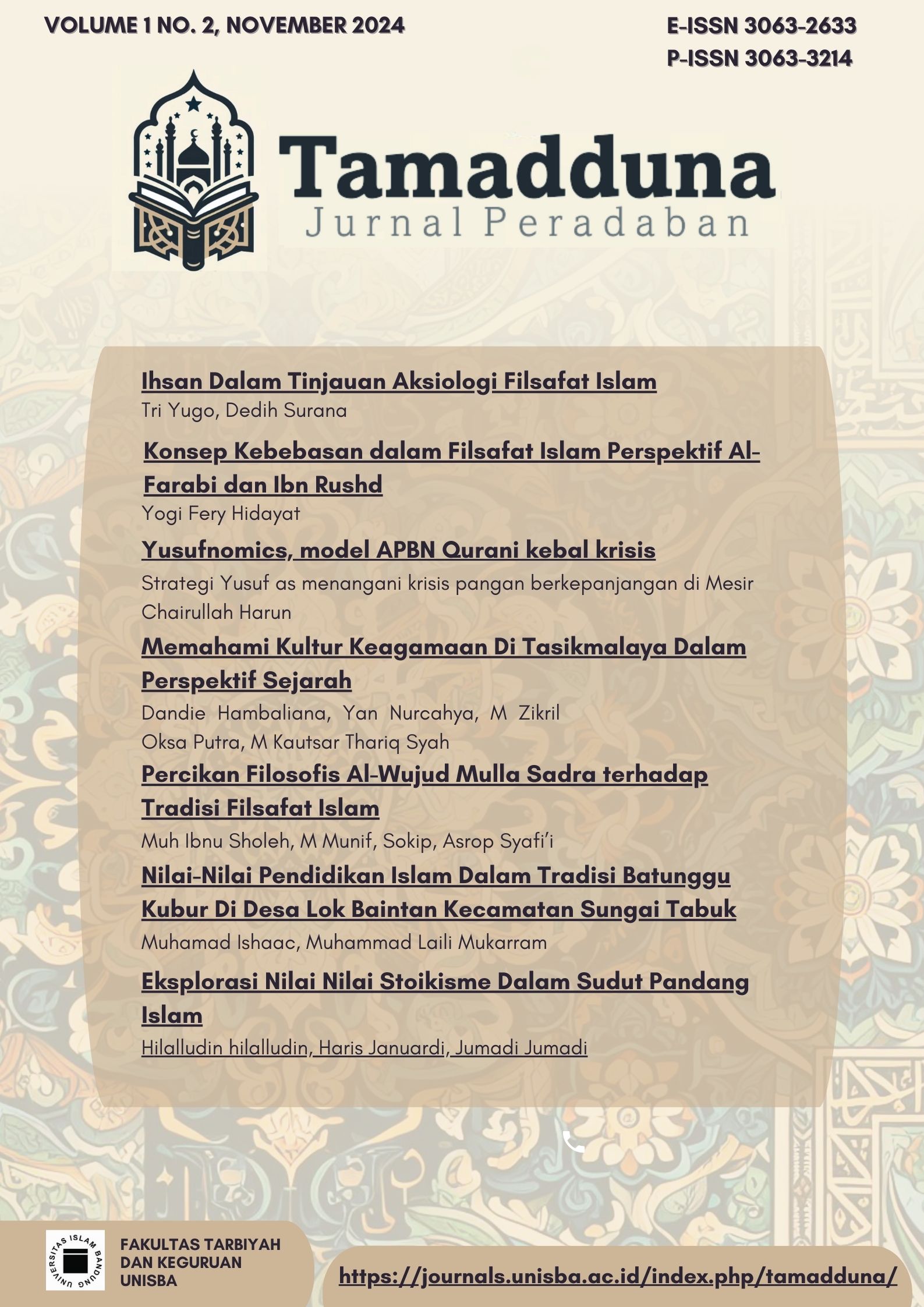Philosophical Insights on Al-Wujud by Mulla Sadra in the Context of Islamic Philosophy
DOI:
https://doi.org/10.29313/tamadduna.v1i2.4870Keywords:
Philosophy of being, Ibn Arabi, Suhrawardi, substantial motion, ontological aspects, theological, cosmologicalAbstract
This research examines the concept of al-Wujud (Being) in Mulla Sadra’s thought, which significantly influences Islamic philosophy. Mulla Sadra, a prominent philosopher in the Islamic tradition, developed this concept by emphasizing the philosophical view that everything in existence is merely a manifestation of a Single Being, which is God. This study employs the library research method by analyzing Mulla Sadra’s major works and comparing them with the views of other Islamic philosophers, such as Ibn Arabi and Suhrawardi. The findings indicate that Mulla Sadra’s Philosophy of Being aligns closely with the concept of Wahdat al-Wujud (Unity of Being), deeply intertwined with the systematic framework of Islamic philosophy, encompassing ontological, cosmological, theological, and ethical aspects. One of Mulla Sadra’s major contributions is his theory of substantial motion (al-harakat al-jauhariyyah), which posits that every entity in the universe undergoes substantial change towards the perfection of existence. This theory supports the idea that all beings are continually moving towards unification with the Divine Being. This concept enriches the metaphysical understanding in Islamic philosophy, where reality is viewed as a connected spectrum of existence, and human ethics are directed towards spiritual perfection, ultimately leading to closeness with God. Furthermore, the research touches on a comparative analysis of Mulla Sadra’s Philosophy of Being with the thoughts of Ibn Arabi and Suhrawardi, offering relatively new insights into the integration of spirituality and rationality in the evolution and development of Islamic philosophy.
References
Daftar Pustaka
Ahmed, E. (2018). Mulla Sadra’s Notion Of Existence:A Comparative Review. Al-Hikmat: A Journal of Philosophy, 38.
Akbar, A. (2016). Looking at Ibn ‘Arabi’s Notion of Wahdat al-Wujud as a Basis for Plural Path to God. Journal of Islamic Studies and Culture, 4(1). https://doi.org/10.15640/jisc.v4n1a6
Akbari, R. (2021). Mulla Sadra on Beauty and Art. The International Journal of Humanities, 28(1).
Ali, N. (2016). Religious language in the transcendent philosophy of Mulla Sadra. Kom : Casopis Za Religijske Nauke, 5(2), 23–38. https://doi.org/10.5937/kom1602023N
Aziz, M. (2015). Mulla Shadra [1571 M - 1636 M] (Study Tentang Pemikiran Al-Hikmah Al-Muta’aliyah Dan Al-Asfar Al-Arba’ah). Al Hikmah: Jurnal Studi Keislaman, 5(1).
Bowen, G. A. (2009). Document Analysis as a Qualitative Research Method. Qualitative Research Journal, 9(2), 27–40. https://doi.org/10.3316/QRJ0902027
Corbin, H. (2014). History of Islamic philosophy. routledge.
Dewi Nur Asiyah. (2022). Pandangan Ibn Al-Arabi Mengenai Wahdat Al-Wujud dan Konsep Kebahagiaan. Spiritualita, 5(2), 73–82. https://doi.org/10.30762/spiritualita.v5i2.844
Elahi, M., Behesht, I., Razavi, S. H., Mousavi, S. A. A., & Hosseini, S. M. (2022). A comparative study of the status of the perfect human being from the perspective of Mulla Sadra and Kant. Journal of Positive School Psychology, 6(3).
Faruque, M. U. (2018). The Labyrinth of Subjectivity: Constructions of the Self from Mullā Ṣadrā to Muḥammad Iqbāl. University of California, Berkeley.
Fink, A. (2019). Conducting research literature reviews: From the internet to paper. Sage publications.
Gliner, J. A., & Morgan, G. A. (2017). Research Methods in Applied Settings: An integrated approach to design and analysis.
Iqbal, M. (Ed.). (2017). Between Physics And Metaphysics: Mulla Sadra On Nature And Motion (1 ed.). Routledge. https://doi.org/10.4324/9781315259475
Kalin, I. (2010). An Annotated Bibliography of the Works of Sadr al-Din al-Shirazi (Mulla Sadra) with a Brief Account of His Life. Islamic Studies, 42(1).
Kavyani, M. S., Razmi, H., & Parsania, H. (2024). Reconstructing William Lane Craig’s Explanation of Absolute Time Based on Mulla Sadra’s Philosophy. Sophia, 23(3). https://doi.org/10.1007/s11841-024-01038-6
Kermani, T. (2014). Diskursus Akhlak dalam Filsafat Mulla Sadra. Kanz Philosophia : A Journal for Islamic Philosophy and Mysticism, 4(1), 78. https://doi.org/10.20871/kpjipm.v4i1.56
Maliki, A. (2021). Menggagas Epistemologi Dalam Filsafat Islam. At-Thariq: Jurnal Studi Islam dan Budaya, 1(2). https://doi.org/10.57210/trq.v1i2.80
McKenney, S. E., & Reeves, T. C. (2012). Conducting educational design research. Routledge.
Nasr, S. H. (2006). Islamic Philosophy from Its Origin to the Present: Philosophy in the Land of Prophecy. State University of New York Press.
Nur Laini, H. U., & Soleh, A. K. (2024). Ajaran Isyrāqi: Studi Kritis-Epistemologis Filsafat Iluminasi Suhrawardi. Kalimah: Jurnal Studi Agama dan Pemikiran Islam, 22(1), 1–24. https://doi.org/10.21111/klm.v22i1.12274
Rahman, A. R. (2022). KONSEP JIWA MENURUT MULLA SHADRA. https://doi.org/10.31219/osf.io/uwyxa
Rahman, F., & Muzammil, S. (2023). Penafsiran Paradigma Wahdah Al-Wujud Dalam Pemikiran Islam: Studi Komparasi Gagasan Kesatuan Wujud Ibrahim Al-Kurani Dan Mulla Sadra. ESOTERIK, 9(1), 53. https://doi.org/10.21043/esoterik.v9i1.18461
Rezazadeh, R. (2011). Thomas Aquinas and Mulla Sadra on the Soul-Body Problem: A Comparative Investigation. Journal of Shi’a Islamic Studies, 3(2).
Rizvi, S. (2020). Tradition and Islamic Philosophy: Some Recent Urdu Publications on Mullā Ṣadrā. Journal of Urdu Studies, 1(1), 27–52. https://doi.org/10.1163/26659050-12340002
Rustom, M. (2009). QurÞanic Exegesis in Later Islamic Philosophy: MullÁ ÑadrÁ’s TafsÐr SÙrat al-FÁtiÎa. University of Toronto (Canada).
Saputra, H. (2016). Konsep Epistemologi Mulla Shadra. Substantia, 18(2).
Saputra, M. D. H. (2022). Islam Sebagai Alternatif Paradigma Dan Epistemologi Ilmu Pengetahuan. Jurnal Al-Aqidah, 14(1), 57–73. https://doi.org/10.15548/ja.v14i1.3970
Shah, S. A. (2018). Conception Of Time And Being In The Transcendent Philosophy Of Mulla Sadra. Journal of Social Sciences and Humanities, 50(1).
Shah-Kazemi, R. (2012). The spirit of tolerance in Islam. I.B. Tauris in association with the Institute of Ismaili Studies.
Shull, F., Singer, J., & Sjøberg, D. I. K. (Ed.). (2008). Qualitative Methods in Empirical Studies of Software Engineering. Springer.
Trisno, A. (2022). Model Penalaran Epistemologi Irfani; Filsafat Al-Hikmah Al-Muta’aliyah Mulla Shadra. Journal of Islamic Thought and Philosophy, 1(02).
متولی حقیقی, م., صحاف, م. خ., & کمالی زاده, ط. (2023). تعالی در معماری ایرانی با تاملی در حکمت متعالیه. باغ نظر, Online First. https://doi.org/10.22034/bagh.2023.404885.5410











